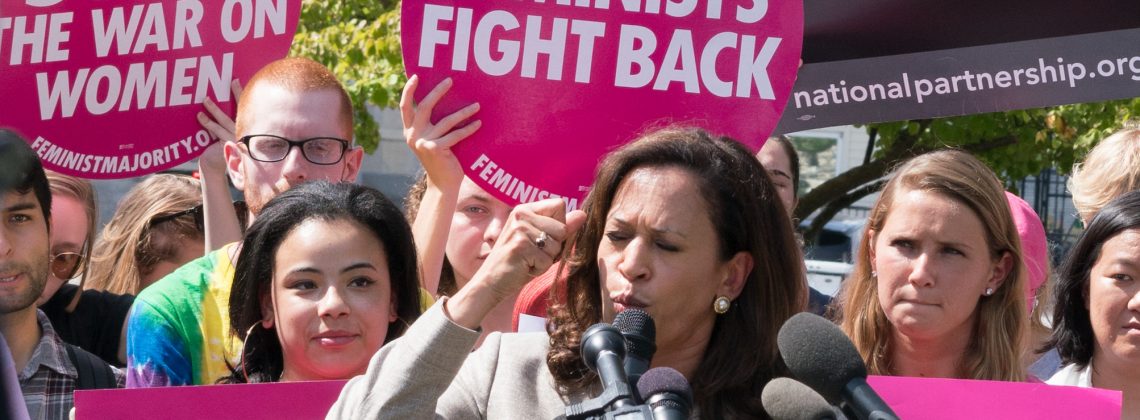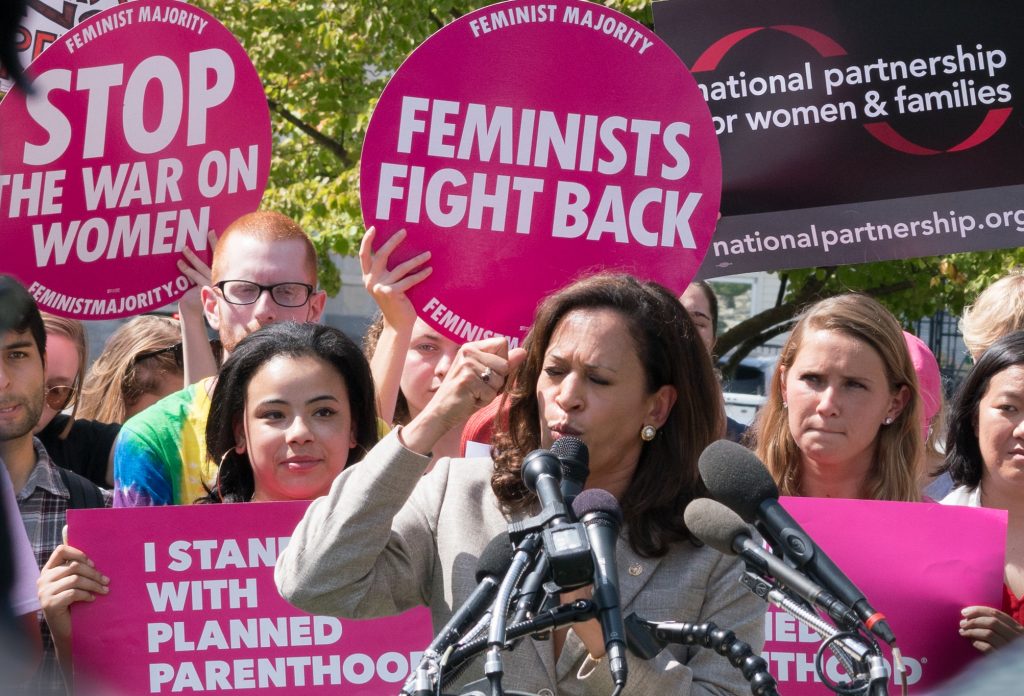

If they did, they might find themselves more in line with their constituencies
Democratic politicians who think they can pick up votes in the midterm elections by emphasizing their strong support for abortion rights may run into an uncomfortable reality: Nearly half of all Americans—including 28 percent of Democrats—believe that abortion is morally wrong. Many of these voters don’t want to see abortion become completely illegal. But they may not want to see politicians ignore its troubling moral dimensions either.
In the latest Gallup poll on the topic, taken in 2021, 46 percent of Americans said that abortion was generally “morally wrong,” while 47 percent said it was generally “morally acceptable.” But if the American population as a whole is split almost evenly on abortion, the demographic groups to which Democrats have traditionally tried to appeal—lower-income Americans and non-whites—are much more likely to view abortion as morally wrong. That may spell trouble for pro-choice Democrats who have never learned to acknowledge abortion’s morally troubling aspects.
Democratic politicians often believe they can mobilize women’s votes by talking about reproductive rights. But moral views on abortion do not vary at all by gender. Both men and women split 47-46 on the question of whether abortion is morally acceptable.
If views on abortion’s morality are not affected by gender, they vary dramatically by education and income. Only 33 percent of Americans who have not attended college believe that abortion is generally morally acceptable, and 61 percent believe it is generally morally wrong. Conversely, among those with a graduate degree, 72 percent believe abortion is generally morally acceptable and only 25 percent think it is morally wrong in general. Similar splits occur in income level: a majority of Americans whose household income is less than $100,000 per year think abortion is generally morally wrong, but for those whose household income is higher than $100,000 per year, voters who believe abortion is generally morally acceptable outnumber by nearly two to one those who think abortion is morally wrong.
Region also makes a difference. In the South, only 41 percent think abortion is generally morally acceptable, while 52 percent think it is morally wrong, whereas in the Northeast, 53 percent think it is morally acceptable.
In addition, non-whites are more likely to think of abortion as morally wrong. 57 percent of Hispanics and non-whites (but only 47 percent of non-Hispanic whites) said that abortion is morally wrong, and only 39 percent said it was morally acceptable.
But perhaps the starkest differences are revealed when religious behavior is taken into account. Among those who attend church weekly, 74 percent think abortion is morally wrong and only 21 percent think it is generally morally acceptable. Among those who attend church monthly or “nearly weekly,” 54 percent said that abortion is generally morally wrong and 41 percent think it is generally morally acceptable. But among those who seldom or never attend church, only 29 percent think abortion is generally morally wrong; 62 percent think abortion is generally morally acceptable.
This doesn’t necessarily mean that more religiously observant Americans want abortion to be illegal. Many do (especially among white evangelicals and religiously observant Catholics), but especially among Black Protestants, religious observance does not always correlate with higher opposition to keeping abortion legal. 66 percent of Black Protestants want abortion to be mostly or entirely legal, and only 28 percent want it to be mostly or entirely illegal. But even if they don’t want to see abortion legally prohibited, fewer than 50 percent of all Black Americans (whether religiously observant or not) think abortion is morally acceptable.
So in essence, Americans who are less wealthy, less educated, and more religious tend to believe abortion is morally wrong, while those who are more wealthy, more educated, and less religious tend to believe abortion is morally acceptable. And yet Democratic politicians who say they want to appeal to lower-income voters and racial minorities have adopted a strident defense of abortion rights that is uniquely suited to the views of secular, white, upper-income, highly educated voters in the North.
This is especially true in a southern swing state like Georgia, which is one of the many states where abortion will likely soon be restricted and where Democrats are trying to rally voters around the cause of protecting abortion rights. The demographic data from Georgia suggest that the current Democratic message on the issue will not resonate with a majority of the state’s voters if it fails to take into account their moral reservations about abortion. Georgia has higher-than-average church attendance rates, with 42 percent of Georgians attending church weekly (at least before the pandemic) and another 34 percent attending at least some of the time. Only 24 percent attend church seldom or never. The state is also generally working-class, with an average household income of $58,000. Fewer than one-third of the state’s adults have a four-year college degree.
But we also know from public opinion polls that a majority of Georgia voters do not want Roe v. Wade to be overturned and do not want the state’s six-week abortion ban to go into effect (which it will, if the Supreme Court overturns Roe next month). Some of the state’s Democratic politicians are trying to capitalize on this sentiment by pledging to keep abortion legal. But in a state where most Democratic votes come from the 48 percent of residents who are Hispanics, African Americans, or other non-whites, a message of abortion rights advocacy the greatest appeal for which is for upper-income, highly educated whites in the North may not play very well among voters who overwhelmingly view abortion as morally problematic—even if they want to keep it legal.
What would happen if, instead of focusing their attention on keeping abortion legal, Democratic politicians began talking more about something a majority of Americans (including millions of Democrats) actually support: reducing the number of abortions?
What if Democratic politicians began running ads that denounced Republicans in Georgia (and other states) for driving up abortion rates by refusing to provide the healthcare necessary to give low-income single mothers the confidence they need to welcome another child into their family, instead of terminating a pregnancy?
What would happen, in other words, if Democratic politicians acknowledged voters’ moral discomfort with abortion and promised to reduce abortion rates by offering women the support they need to make meaningful choices about the future of their families?
Daniel K. Williams is a professor of history at the University of West Georgia and the author of several books on religion and American politics, including God’s Own Party: The Making of the Christian Right and The Politics of the Cross: A Christian Alternative to Partisanship. He is a Contributing Editor at Current.
Well 80 percent believe abortion is a private decision and not the government’s business.
There is a morally wrong side to abortion, and it is the position that women should not have control over their own bodies, or that others should make decisions for them.
I am prolife, but I do not agree with the overturning of Roe v Wade. I was a young married women when Roe v Wade was determined. Back then, it was not such a controversial thing. The controversy slowly started; but in my experience, it did not become so polarizing, somewhere around the mid 1980’s. From the start, my husband I considered abortion to be a moral issue and not a legal issue. I did however, approve of the legislation that put some fences up such as a 72 hours wait period between admission to abortion service and the scheduled abortion. In my experience, many women did not show up for their appointment. Deciding to abort an unplanned pregnancy is a heavy decision, and most women who have one, will not forget the experience; they will carry the guilt, and they will carry it alone. However, they will not carry the extra burden of being viewed as guilty under the law. In short, I agree with Mr. Williams, that my party would do well to focus more on abortion as a moral issue.
Susan: I doubt that many people believe that abortion on demand is a good thing. I tend to be a realist on this issue. What can we do, outside of ROE, to help women so that we can reduce the number of abortions? This is the question we need to ask more in such a way that it shapes policy. Dan is right. I wish more pro-choice politicians would speak about abortion as a moral problem. Obama did this a lot, but he didn’t do it enough. So did Clinton. I am disappointed that Biden, a lifelong Catholic, pro-life Democrat, has not done it.